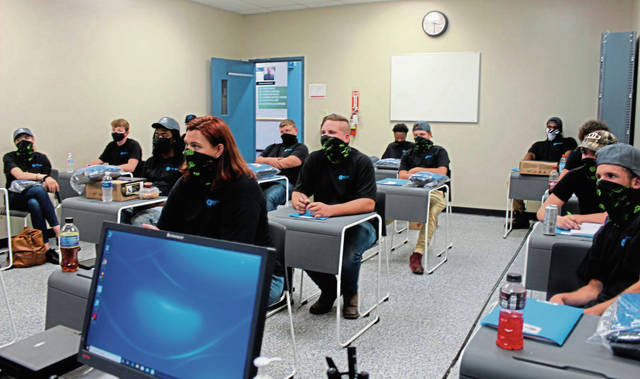Patrick Varine
Candace Carlton recently earned a massage therapy license. Unfortunately, the past six months have made it tough to put it to use.
“That doesn’t do too well during a pandemic,” Carlton said.
The prospect of going back to school also is challenging, given that school districts, colleges and education centers all over the country are trying to find a way to bring students back safely.
But when it comes to an educational opportunity with generally smaller class sizes, and a chance to learn skills that can be put to work immediately, Carlton and others have begun looking to the region’s trade and technical schools.
“I was always interested in working with vehicles, whether it was something small in my own vehicle or having been with my fire department for the past 15 years,” said Carlton, 29, of Potter in Beaver County, who works as a dispatcher with the CoachUSA bus company.
Carlton attended vo-tech classes in high school but gravitated toward the health care industry after a stint in the military. An associate’s degree and the massage therapy license didn’t get her where she needed to be, but her current job — and the need for skilled workers — got her thinking about a trade career.
“Dispatching the buses sort of brought everything full circle,” said Carlton, who started classes in early August at Rosedale Technical College in Kennedy Township. “I have the ability to do this. I’m going to become a diesel technician. That’s a job that will always be needed.”
Tyler Waryas, 19, of Export felt the same way. His initial plan was to attend a four-year college, possibly Penn State. But he will pursue a degree in heating, ventilation, air conditioning and refrigeration at Westmoreland County Community College.
“If I get a degree in HVACR, I can get a job quickly, build up my resume, move wherever I want with my family and have work in the trades,” he said.
Rosedale President Dennis Wilke said technical schools offer not just smaller class sizes, but also training for careers that are in demand during regular times, many of which are considered essential during the pandemic.
“We know how scary it must be for graduates to try and navigate next steps in these unprecedented times,” Wilke said. “But we have a solution that could work for so many prospective students looking for a meaningful career with a lot of demand.”
The school’s vice president of college development, Craig Rosati, said the economic downturn in the U.S. has not hit many of the areas in which Rosedale and others offer training.
“Many of our programs are training essential workers, which in many cases is in higher demand since the pandemic,” Rosati said.
And those skills can be learned in less than two years in most cases.
‘Break that stigma’
The rapid training and high-percentage job placement among trade workers is one of the reasons that high school guidance counselors are looking to introduce students to the trades at a younger age.
In the Franklin Regional School District, fifth graders took a field trip to Northern Westmoreland Career & Technology Center to learn about skilled labor from students and staff there.
“We want our students to be exposed to different pathways and to really be thinking about where they want to go with their education,” said Jeff Stanczak, senior internship coordinator at Franklin Regional Senior High School. “Education is not one pathway. College is not the only option. And for a lot of folks, including my family when I was growing up, parents often think trade schools can get you a job, but not a career.”Learning a trade skillFranklin Regional senior internship coordinator Jeff Stanczak talks about introducing students to trade careers at a younger age, and breaking the old stigma surrounding vo-tech education.Volume 90%
Carlton and Waryas both said the stigma about vo-tech education has largely disappeared.
For Carlton, who graduated in 2009, the stigma was wearing off but wasn’t quite gone yet.
“Some people thought it was ‘the easy way out,’ and then other people thought it was really cool,” she said. “It was sort of split.”
Waryas said most students today view it as just another educational option.
“I definitely don’t think there’s a negative view about it,” he said. “It’s just not the right career path for some people.”
While Carlton has begun in-person classes, Waryas is waiting to see what shape his first month at WCCC will take. “I know most of it is online in the fall,” he said. “It’s still up in the air whether I’ll be there immediately.”
In addition to high school graduates looking to further their trade education, technical schools also offer a chance for adults — whether out of work or looking to make a job change — to explore a new career path.
“Right now, we want to help educate adult learners who feel displaced because of our current circumstances with the fall semester quickly approaching,” he said.
Read the original article here: https://triblive.com/local/westmoreland/trade-schools-offer-training-in-high-demand-essential-careers/
